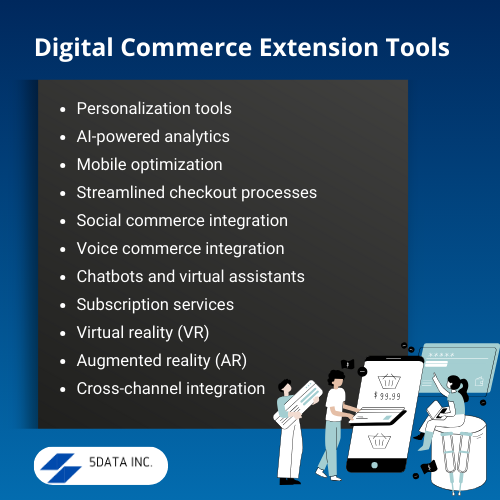Key Takeaways
- E-commerce platforms drive global reach and personalized experiences in digital transformation.
- AI enhances online shopping through personalized recommendations, chatbots, and predictive analytics.
- Tools like AI analytics, mobile optimization, and chatbots boost sales and customer engagement.
- Continuous exploration of tools is vital for staying competitive in the e-commerce landscape.
Digital Transformation And E-commerce
Digital transformation and technology have revolutionized the way businesses operate, and e-commerce is a significant part of this shift. E-commerce enables businesses to reach customers globally, operate 24/7, and provide personalized shopping experiences. Through digital transformation, companies can seamlessly integrate e-commerce platforms with systems like inventory management, customer relationship management (CRM), and analytics, streamlining operations, social media integrations, and improving efficiency. This transformation also involves embracing emerging technologies like artificial intelligence, augmented reality, and chatbots under the expertise of the best mobile application development services to enhance the e-shopping experience and stay competitive in the digital landscape.
Artificial Intelligence And Digital Commerce
AI plays a vital role in e-commerce by enhancing various aspects of the online shopping experience. Marketing automation enhances product data management, advanced product management, drag-and-drop features, and technical capabilities that account for the seamless shopping experience in the e-commerce industry. Digital Commerce expands your e-commerce store into a multi-vendor marketplace platform, elevating customer options and business opportunities.
Here are some key applications that can be performed with the integration of a software application development company:
1. Personalized recommendations:
AI algorithms analyze customer call data analysis and behavior data processing to filter personalized product recommendations, improving the likelihood of conversions and customer satisfaction.
2. Chatbots and virtual assistants:
AI-powered chatbots offer real-time customer support, answer customer queries first, and guide shoppers through the purchasing process, improving customer service, sales channels, and engagement.
3. Predictive analytics:
AI algorithms analyze huge data to predict customer behavior, trends, business growth, emerging trends, and demand, helping businesses make data-driven decisions in areas like inventory management, pricing strategies, and marketing campaigns.
4. Visual search:
AI enables visual search capabilities, allowing customers to dive into search engines for various products using images rather than text search results. This feature facilitates product discovery and enhances the shopping experience.
5. Fraud detection:
AI algorithms detect fraudulent activities such as payment fraud and account takeover attempts, helping e-commerce businesses safeguard themselves and their customers from cyber threats.
6. Dynamic pricing:
AI-powered pricing algorithms adjust prices in real time depending on factors like demand, competitor pricing, and customer behavior, optimizing revenue and profitability for potential customers.
Overall, AI empowers e-commerce businesses to deliver personalized experiences, improve operations, and stay competitive in the rapidly evolving digital and e-commerce business landscape.

Digital Commerce Extension Tools
Empowering online businesses with smarter digital commerce extensions involves integrating these advanced marketing tools and features like personalized recommendations, AI-driven analytics evaluated through a mobile application development company, streamlined checkout processes, and responsive design to enhance user experience and drive sales. These extensions can optimize operations, boost customer engagement, and ultimately increase revenue.
Using the right e-commerce tools improves SEO optimization. Mentioned below is a list of strategies to support online businesses with smarter marketing efforts leveraging digital commerce businesses.
1. Personalization tools:
Using tools to analyze user behavior and preferences for personalized product recommendations, marketing tools, tailored marketing messages, and customized experiences can enhance user engagement and increase conversions.
2. AI-powered analytics:
Leveraging AI and machine learning algorithms to predict trends, analyze customer data for valuable insights, and optimize marketing strategies can help businesses make data-driven decisions, improve targeting, and maximize ROI.
3. Mobile optimization:
Ensuring that digital commerce and e-commerce websites are totally optimized for mobile devices, including responsive design, fast loading times, and intuitive navigation and user interface, can record the growing number of mobile shoppers and enhance the overall user experience.
4. Streamlined checkout processes:
Simplifying the checkout process in e-commerce stores by implementing features like one-click purchasing, guest checkout options, and multiple payment gateways can reduce cart abandonment rates and increase conversion rates.
5. Social commerce integration:
Integrating social media platforms into the digital commerce experience, enabling customers to shop directly from social media posts, or leveraging social media integration and user-generated content as AI tools for product promotion can expand reach, drive traffic, and boost sales.
6. Voice commerce integration:
Embracing voice-activated technology into the e-commerce journey and integrating voice commerce capabilities, such as voice search and voice-controlled purchasing, into the e-commerce platform can cater to the growing number of users using voice assistants for online shopping.
7. Chatbots and virtual assistants:
Implementing chatbots and virtual assistants powered by AI to make customer interactions, provide personalized customer support, answer product inquiries, and assist with purchasing decisions can improve customer satisfaction, reduce response times, and increase sales.
8. Subscription services:
Offering subscription-based models for products or services, supported by a comprehensive suite of intelligent subscription management analytics tools, can provide predictable revenue streams, foster customer loyalty, and increase customer lifetime value.
9. Virtual reality (VR) and augmented reality (AR):
Integrating AR and VR technology to enable virtual try-on experiences, product visualization, and interactive shopping experiences can enhance engagement, reduce returns, and differentiate the brand in the competitive digital commerce and e-commerce business landscape.
10. Cross-channel integration:
Ensuring smooth integration between online and offline channels, such as enabling click-and-collect options for basic online stores, providing in-store pickup for online orders, and syncing inventory across channels, can offer customers more flexibility and convenience while driving sales and improving operational efficiency.
Conclusion
Let’s wrap up our journey into the world of e-commerce platforms and digital commerce tools with the understanding that there’s so much more to explore in this dynamic industry. The e-commerce sector presents both opportunities and challenges, and to remain competitive, you need to equip yourself with comprehensive knowledge and leverage the most effective tools available.
Frequently Asked Questions
What is the power of tools in e-commerce?
E-commerce involves managing various aspects for business success. Access to a professional service team is crucial for informed decisions. Wayfair, an e-commerce company, uses tools like Salesforce CRM to streamline operations, develop targeted campaigns, and offer personalized product recommendations to customers.
What are the pros and cons of e-commerce platforms and tools?
E-commerce platforms offer businesses a global reach, convenience for customers, cost savings, valuable data insights, and scalability. However, they also come with challenges, such as security risks, technical issues, intense competition, dependency on technology, and the need to build and maintain customer trust. Managing these aspects is crucial for success in the digital commerce landscape.
How does 24/7 customer service worldwide work with ML chatbots?
Customers expect quick responses to their queries, even outside business hours. Chatbot technology can assist by answering frequently asked questions, regardless of the customer’s location. With chatbots, customers can receive help with inquiries and requests in different parts of the world, such as Bangkok or the UK, regarding specific products or services.
How does AI enhance personalization?
AI can predict consumer behavior using browsing history and past purchases. AI-powered personalized shopping allows for better discounts and accurate product recommendations. Magento eCommerce provides excellent personal service to keep customers coming back.
What are various AI-based tools for eCommerce businesses?
AI can help businesses identify growth opportunities and improve customer experiences through data analysis. By integrating AI tools, businesses can make more informed decisions and improve user interactions. AI can be used in various business processes such as ordering, inventory tracking, inventory analysis, and customer support, making it a valuable tool for enhancing eCommerce.

